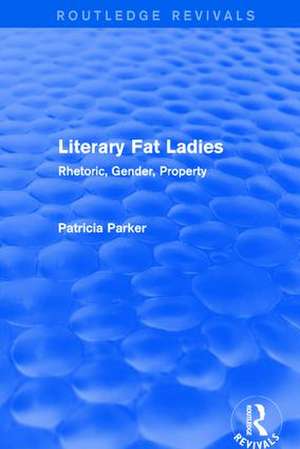Routledge Revivals: Literary Fat Ladies (1987): Rhetoric, Gender, Property
Autor Patricia Parkeren Limba Engleză Hardback – 11 aug 2016
Preț: 764.20 lei
Preț vechi: 1102.79 lei
-31% Nou
Puncte Express: 1146
Preț estimativ în valută:
146.23€ • 156.37$ • 121.92£
146.23€ • 156.37$ • 121.92£
Carte tipărită la comandă
Livrare economică 17 aprilie-01 mai
Preluare comenzi: 021 569.72.76
Specificații
ISBN-13: 9781138212053
ISBN-10: 1138212059
Pagini: 288
Dimensiuni: 156 x 234 x 25 mm
Greutate: 0.45 kg
Ediția:1
Editura: Taylor & Francis
Colecția Routledge
Locul publicării:Oxford, United Kingdom
ISBN-10: 1138212059
Pagini: 288
Dimensiuni: 156 x 234 x 25 mm
Greutate: 0.45 kg
Ediția:1
Editura: Taylor & Francis
Colecția Routledge
Locul publicării:Oxford, United Kingdom
Cuprins
Acknowledgments; 1 Retrospective Introduction 2 Literary Fat Ladies and the Generation of the Text 3 The Metaphorical Plot 4 Suspended Instruments: Lyrics and Power in the Bower of Bliss 5 Transfigurations: Shakespeare and Rhetoric 6 Motivated Rhetorics: Gender, Order, Rule 7 Rhetorics of Property: Exploration, Inventory, Blazon 8 The (Self-) Identity of the Literary Text: Property, Proper Place, and Proper Name in Wuthering Heights Coming Second: Woman’s Place; Notes; Index
Descriere
First published in 1987, the essays in this volume focus on questions of gender, property and power in the use of rhetoric and the practice of literary genres, and provide a historicised cultural critique. They analyse the links between rhetoric and property, but also representations of women as unruly, excessive, teleology-breaking figures — intermeshing with feminist theory in the wake of Freud, Lacan and Derrida. A wide variety of texts — from Genesis to Freud, by way of Shakespeare, Milton, Rousseau and Emily Brontë — are examined, held together by a concern for the entanglements of rhetorical questions of literary plotting, hierarchy, ideological framing and political consequence.
